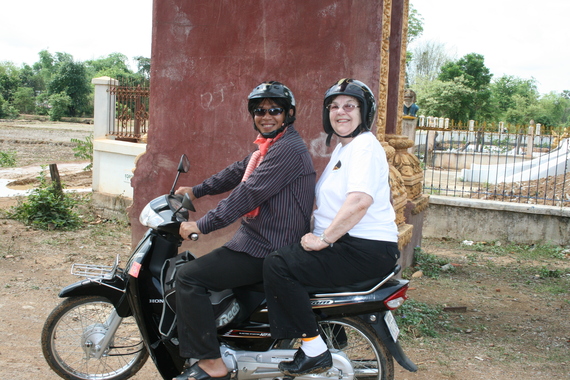
If your holiday plans include a long car trip with your parents, keep in mind that their needs may differ from yours. With a little advance planning and some open communication, though, you can ensure that everyone's needs are met during your drive and avoid the tension that can ruin a trip.
1. Determine the driving plan.
Discuss with your parents whether they are comfortable driving and if so, how long they can drive in one stretch. (Ask yourself those same questions, too!) Then draw up a driving plan, complete with restroom breaks and other pit stops. Be specific! The more specific you are with this list, the more likely you are to be on time for stops (and departures) -- and the less likely you are to hear the dreaded "Are we there yet?"
2. Plan many restroom breaks.
Your parents may be reluctant to mention any incontinence issues they might have, so play it safe: rather than put them in a position of having to discuss what may be an awkward topic for them, assume that they (like many older adults) probably need to use a bathroom frequently. So build into the driving plan restroom breaks at least once every two hours or so.
3. Rent a van or other large vehicle.
Think about how torturous it is to fly coach for long distances, with your knees jammed into the seat in front of you, a stranger reclining into your lap, and your seatmate's elbow fighting yours for the armrest. Don't subject your group to the same conditions when you're driving long distances. Rent a vehicle that's large enough for everyone in the car to stretch out. A van or other large vehicle will also ensure plenty of room for luggage. (Even with that extra space, though, be sure to discuss luggage allowances with everyone well before the start of your trip.)
4. If your parents have a handicapped parking placard, bring it.
The parking lots at rest areas, many attractions (such as museums and visitor centers), and even hotels can be huge! So if your parents have one of these placards, bring it so you can park as close to the entrance as you can and spare them a long walk. If you're traveling without a placard, drop your parents off at your destination and then go park the car. And if one or both of your parents have any form of dementia, be sure not to leave them alone--even if it means they have to walk with you from the far corner of the parking lot--because unfamiliar surroundings could trigger confusion and wandering.
5. Bring motion sickness medicine.
Even if your parents say they have no problems riding in a car, bring some motion sickness medicine anyway (and make sure you know the proper dosages for different ages), just in case the long drive brings on a surprise case of carsickness. Ask your parents' doctor for a recommendation that works with any medicines they're already taking.
6. Bring tissues, paper towels, and sanitary wipes.
You never know when someone will have an upset stomach or spill something during the drive. Having cleaning supplies at the ready will go a long way toward saving the interior of your car (and your sanity!).
7. Know your parents' medication schedules.
Because schedule changes can wreak havoc on your parents' routine, you may need to help them stay on track with their medications. Be sure you know what medicines they take and when (and also bring a copy of their medical insurance information, just in case).
8. Hydrate!
When traveling by car, people often stop drinking water to prolong the time between bathroom stops. But that's the exact opposite of what travelers should be doing! Dehydration can lead to headaches, nausea, and other problems. So fill plenty of water bottles and remind your travelers that because you'll be stopping every two hours, they should drink up!
9. Bring plenty of snacks.
Hungry people are cranky people, so make sure to bring lots of healthy snacks on road trips. You'll want to have food on hand to prevent drops in blood sugar levels (a risk to which older adults are particularly susceptible) and, when you're between meals, to accompany medications that must be taken with food.
10. Don't forget entertainment options.
Nothing spells doom for a long car ride more than boredom. Why not surprise your parents with a new book for the journey? Or bring an iPad or other device for watching videos? Other options include crossword puzzles, newspapers, games (Apples to Apples works well in a car), magazines, and even coloring books. If your parents are prone to motion sickness, though, look into activities that don't require a lot of text reading or screen watching, such as singing songs ("99 Bottles of Beer on the Wall," anyone?) and listening to audiobooks. And don't forget the car games you played as a kid, such as "I Spy," "20 Questions," and "I'm Going to Alaska."
You may also want to discuss (and agree upon) guidelines on who gets to control the car radio, because disagreements on that front can lead to all sorts of conflict while you're on the road!
11. Make sure your car is up for the journey. If you don't usually belong to a roadside assistance program (such as AAA), sign up for one right before your road trip. In addition, get a set of spare keys (for another person in your group to carry, in case you lose yours) and make sure your car is well-stocked with the following:
- Antifreeze
- Jumper cables
- Motor oil
- Windshield wiper fluid
- Maps and driving directions
- Pillows and blankets
- Ice scraper
- Small container of change for parking meters and toll roads
- Spare tire and tire iron
12. Discuss financial matters before you go.
This one can be difficult, because most people aren't comfortable talking about their money openly. But if you don't have a frank conversation with your parents on this topic ahead of time, you may find incorrect assumptions and unmet (and unstated) expectations leading to lots of interpersonal conflict--and disastrous trip together. Some of the questions you should cover include the following:
- How will you share lodging and meal costs?
- Who will pay for the car's fuel?
- Who will pay for speeding tickets and parking tickets? (For example, my mom and I agree that whoever is driving when a speeding ticket is issued has to pay for it, but we split the costs of parking tickets.)
Above all, be sure to bring a sense of humor and a willingness to be flexible. Road trips can be loads of fun, but all those hours together in close quarters can sometimes tax even the best of relationships (especially when everyone wants to turn the dial to a different radio station!). Traveling with aging parents can be especially challenging, because you have a long history with them.
That long history can work to your advantage, though: just think about the great road trips you shared with your parents when you were a kid. Now you can make new travel memories with your parents as an adult. With some extra planning on your part, you and your parents can share enjoyable travels together--both during the holiday season and at any time of the year!

